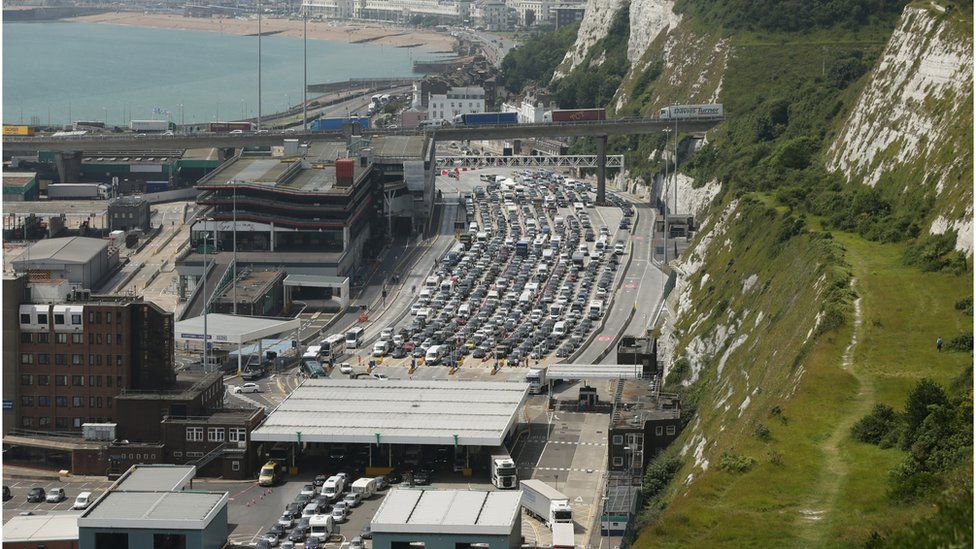Will the government really accept 'No Deal' with the EU?
- Published

One slightly baffling element of the government's Brexit strategy is that it insists it is working on preparing for a "No Deal" scenario. But I am not sure that they really are. A lot of memos are being circulated, but not a lot beyond that. Britain does not seem to be taking the idea of No Deal very seriously. The government is not currently behaving like it is plausible.
There is good sense to the objective of being ready for a collapse in the talks: there is inherent risk in a negotiation of this type with 27 partners. Furthermore, in a negotiation, one of the simplest ways to improve one's position would be to improve what is known as "the outside option". That is, in layman's terms, "what we get if we cannot cut a deal".
Think of it like this: if No Deal is so awful that we can never countenance it, we have a very weak position in terms of asking for concessions from the EU. So preparing for the consequences of No Deal situation is a good idea.
It is true that we cannot mitigate a lot of the risks inherent in a No Deal exit. For example, on aviation. Parts of financial services, the car-makers and big pharma companies will regard the whole idea as a living nightmare. That is why a lot of people regard the government's "No Deal is better than a Bad Deal" rhetoric as bluster.
But take it seriously. Imagine you were an EU27 negotiator trying to work out whether Britain was really countenancing No Deal - or whether this was just cheap talk. What would our government be doing if they were really serious about No Deal? I would suggest ministers are not doing very much of it.
Making No Deal work
Here is a small list of the stuff in ports we need to have sorted in March 2019 if we are to walk away from a negotiation:
- We would need to buy actual space in ports for immigration officers, customs facilities and sanitary checks to make sure imported food meets whatever standards we set. Dover should be humming - soon, at least - with bulldozers and cement mixers as we prepare for a new world with an independent customs policy.
- There have been estimates of a need for 3,000 to 5,000 extra customs officers to cope with the extra traffic inherit in Brexit. Defra will also need to increase staffing and capacity at ports, to allow for the testing of agricultural products and livestock entering the country. We will need new border agents. All these people need recruiting and training.
- The new customs computer system - CDS - is going to need to work. We will also need to replace the EU's Trade Control and Expert System (known as TRACES), the tool for tracking livestock and animal products - a new IT system. And you need both of these things to be in place in time before Brexit, so we can demonstrate it works.
There are decisions we could make to reduce some of that workload. But not by much - and this would not actually make much difference to the disruption inherent in walking away. It would certainly do nothing to fix things like aviation. Even staying within the domain of ports, if our farmers are going to keep selling into Europe, we need west European states to have capacity to perform the checks on our produce - which they currently lack. It would also cost money.
But, if the government were really serious about having the option of walking away, this is stuff they would be doing. It is the section of No Deal that is in our government's power to deal with. And some of that preparation is actually stuff which we might need to do anyway for whenever transition ends.
One of the strongest arguments for the idea that the government should have waited before triggering Article 50 is that it could have used the extra time to do work on what a new customs or immigration system should look like, for example, and work out answers to dull questions like "what land will we need to house new facilities?".
We are where we are, though. And the big point is this: ministers keep talking about being ready to take "No Deal". I keep hearing about the terrifying No Deal memos emerging in Whitehall. Ministers keep denying that the problems they cannot avoid - like those aviation treaties or the potential delays in French ports - are putting them off from countenancing such an outcome.
But, at the same time, our government is not behaving like it is really preparing for No Deal - and the EU27 can surely see it. Unless the government starts allocating resources to prepare for the parts of a clean exit in 2019 that it can control, no-one will seriously believe they're considering it. It makes a transition of some kind - on whatever terms it is offered - much more likely.